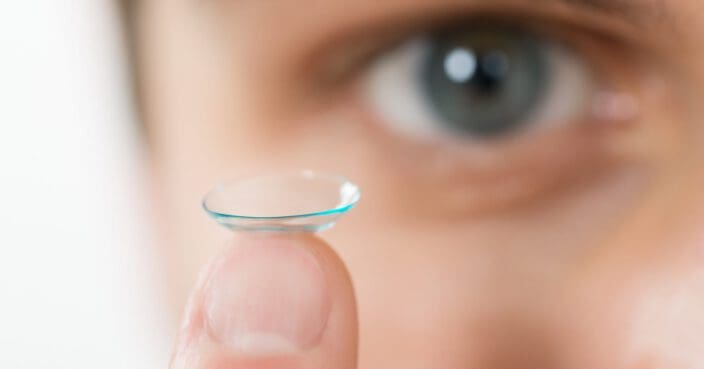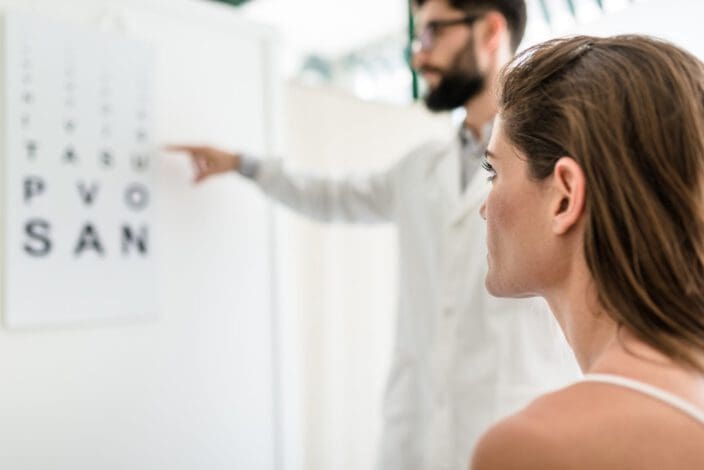Blurry Vision From Contacts? What the Reasons May Be
Home / Understanding Contacts /
Last Updated:
Why Are My Contacts Blurry?

If you have blurry vision from contacts, it might be due to:
- An outdated prescription.
- A new prescription that your eyes are adjusting to.
- Poorly fitting contacts.
- Wearing your contacts for too long.
- Allergies.
You deserve clear vision. We can help.
With 135+ locations and over 2.5 million procedures performed, our board-certified eye surgeons deliver results you can trust.
Your journey to better vision starts here.
The most likely cause of blurry vision is a refractive error.
Table of Contents
Nearsightedness, farsightedness, and astigmatism all involve changes in the shape of your lens, which is right behind your pupil and responsible for refracting light onto the retina. If light does not refract correctly, your brain interprets the signals from the retina as blurry or double images. Wearing glasses or contact lenses are the most common ways to correct refractive errors.
There are also several medical conditions, from eye infections to high blood pressure, which contribute to blurry vision. Wearing contact lenses may improve vision if these conditions are well controlled, but they can exacerbate eye problems like infections. If an underlying medical condition goes undiagnosed, your visual acuity will not improve much with glasses or contacts.
If you wear contact lenses, it is important to get regular eye exams and keep up with your prescription. You should also make sure you are keeping your contacts clean to reduce the risk of infection.
Blurry Vision With Contact Lenses

If you experience blurry vision while wearing contact lenses, there may be several reasons for this problem, which range from issues that can be easily fixed to serious medical issues.
- Old prescription: The most common reason your vision is blurry, even with contact lenses, is an outdated prescription. Refractive errors progress as you get older, so you need to keep up to date with the changes. Even if you only need a new prescription every five years, keeping up with this change means you will see clearly for longer.
- New prescription: If you just updated your prescription, your eyes need to adjust. You may have become used to squinting, blinking, or moving your head to see better. With a new prescription, these subtle behaviors may contribute to a little eye strain. In two weeks or less, your eyes should adjust to the new prescription, and you will see clearly without trouble.
- Astigmatism: If your vision is blurry at all distances, you may have astigmatism. This is caused by an irregularly shaped cornea, which means that fitting contact lenses can be more complicated. Your contact lens may move out of place more frequently, causing your vision to blur. You can blink the contact lens back into place or use eye drops to help; however, you should also talk to your optometrist or ophthalmologist about contact lenses designed for astigmatism.
- Incorrect fit: There are other manufacturing reasons your contact lenses may not fit on your eyes, so you may want to try a few different brands to see which ones work best with your eyes. Brands that do not sit properly on your eyes can cause eye strain or make your vision blurry due to undercorrection.
- Wearing them too long: Over the course of a day, your contact lenses will collect dirt and proteins from your eyes. Take them out when they become uncomfortable, and make sure to use appropriate contact lens cleaning solution. Keep them in that solution for several hours, usually overnight, so all the detritus is removed, and you can wear them again in the morning. Different types of contact lenses have different shelf-lives. For example, some contact lenses are made to be worn for only one day, while others can be worn for a full month. Make sure you know how long you can safely wear your contact lenses, and dispose of them when their shelf-life is over. Wearing them for longer increases the risk of infections and decreases the lenses’ effectiveness.
- Allergies: If your eyes water too much or not enough due to allergic reactions, your contact lenses may not sit properly on your eyes and may not correct your vision well.
- Dry eyes: If you have consistently dry eyes for any reason, you may need to talk to your eye doctor about how best to wear contact lenses. You could apply eye drops a few times per day, or you may need to consider other options besides contact lenses, depending on how serious your dry eyes become. If your eyes are too dry, your contact lenses will not have a surface to float on, and they will not be able to work with the natural lens inside your eye to refract light very well.
- Eye floaters: You may develop temporary spots, or floaters, that drift in and out of your field of vision. This may impact how well you see for a brief period. It might feel like your contact lenses are shifting in your eyes. However, eye floaters exist in the vitreous gel that makes up most of the middle of your eye, and they increase with age. Keeping your eyes healthy — including keeping your contact lenses clean and your prescription up to date — reduces the impact of floaters. If they suddenly get worse, you may have an underlying condition that needs treatment.
- Eye infection: Blurry vision and eye irritation are two signs that you have an eye infection. Unclean contact lenses can cause eye infections; wearing contact lenses increases your risk of trapping pathogens or dirt in your eye; and wearing contact lenses for too long increases your risk of scratching or puncturing your eye, allowing bacteria or fungus through. If your eyes become irritated or red, itchy or swollen, or you develop discharge, stop wearing your contact lenses and go to your optometrist for treatment. Infections can cause long-term damage to your eye when left untreated, so get help immediately. Blurry vision, with or without contact lenses or glasses, can also indicate viral infections like herpes.
- Cataracts: Blurry vision is one sign that you might be developing cataracts. However, you are not likely to notice this symptom until cataracts have progressed very far. If you go to regular eye appointments, your eye doctor is more likely to notice small spots or areas of cloudiness in your lens during an examination, and you may not have noticed any changes in your vision. Your eye doctor will monitor the progression of this condition, which can take decades to become serious. Correcting your vision with glasses is one approach to managing symptoms of cataracts. You may be able to wear contact lenses in the early stages of cataract development; however, contact lenses may be less effective than high-prescription glasses at some point.
- Glaucoma: This is another serious eye condition that progresses to degrade your visual acuity. Unlike cataracts, glaucoma is caused by high fluid pressure in the eyes. One symptom may be blurry vision, even with contact lenses. Other symptoms include “tunnel vision” and blurriness in your peripheral vision. Again, going to regular eye exams can help your doctor diagnose this condition early and monitor its progress. You may be able to wear contact lenses in the early stages, but listen to your eye doctor’s recommendations to keep your eyes healthy.
- Macular degeneration: This condition will eventually cause blindness, but early stages may lead to blurry vision. The most common form of macular degeneration is age-related, so you may think that your eyes are “getting old” rather than suffering from an underlying condition. Instead of buying over-the-counter glasses to read clearly, go to an optometrist to be sure you do not have any other visual problems.
- Hormonal changes: Pregnancy, menopause, and other hormonal changes can change your vision. Even if your contact lens prescription is up to date, these physical changes will impact how well you see.
- Migraines: Blurry vision, glares and halos, flashes of light, and seeing zigzag patterns are symptoms of ocular migraines or migraine headaches. These are temporary conditions that often go away, but if you suffer from them regularly, go to your general practitioner for a full checkup. Contact lenses will not manage the blurry vision associated with migraines.
- Diabetes: Diabetic retinopathy starts with blurry vision as one of the first symptoms. If your vision gets worse quickly, and you cannot see well with glasses or contact lenses, see your regular doctor to test for underlying conditions like diabetes. Working with both a general medical doctor and an ophthalmologist can manage visual blurring from diabetes.
- Cardiovascular disease: Heart disease damages the veins and arteries in the eyes, which can lead to changes in vision. As with diabetes, if your vision is changing very quickly and even corrected vision is blurry, go see your doctor for a physical.
You deserve clear vision. We can help.
With 135+ locations and over 2.5 million procedures performed, our board-certified eye surgeons deliver results you can trust.
Your journey to better vision starts here.
Regular Eye Exams Keep Your Vision Healthy

If you see an optometrist or ophthalmologist every year or two, they can catch any changes in your refractive error, address any eye infections, and diagnose more serious eye diseases like glaucoma.
It is unlikely your vision will change very often, but if you find you frequently need new prescriptions, your eye doctor may tell you to go to a general practitioner for a physical to see if you have an underlying condition.
In general, keeping your contact lenses clean and up to date will prevent any discomfort or blurry vision while wearing them.
Frequently Asked Questions
Why are my contacts blurry?
The most common reasons for blurry vision with contacts are an outdated prescription, a new prescription you haven’t adjusted to yet, wearing your contacts for too long, contacts that don’t fit correctly, and allergies.
Should I see a doctor if my vision remains blurry with contacts?
Since the blurriness could be a sign that you need an updated prescription or your contacts don’t fit correctly, you should see a doctor. They can also rule out more serious issues like an eye infection or other conditions.
Does blurriness mean I can’t wear contacts?
Not necessarily. It might mean that you need a different brand or type of contact lens, or you might need a new prescription. In some cases, other issues might be present, like allergies or dry eyes.
Is there a quick fix for blurry vision with contacts?
If you’ve been wearing your contacts for longer than the prescribed time, such as wearing daily disposable lenses for longer than a day, try switching out your contacts for a fresh pair. If that doesn’t clear up the issue, call your optometrist.
You deserve clear vision. We can help.
With 135+ locations and over 2.5 million procedures performed, our board-certified eye surgeons deliver results you can trust.
Your journey to better vision starts here.
References
- Refractive Errors Affect the Vividness of Visual Mental Images. (June 2013). PLOS ONE.
- Why Do My Contact Lenses Keep Shifting Out of Place? (June 2018). American Academy of Ophthalmology (AAO).
- The Allergic Eye: Recommendations About Pharmacotherapy and Recent Therapeutic Agents. (August 2020). Current Opinion in Allergy and Clinical Immunology.
- Signs of Infection From Contact Lenses. (April 2015). Kellogg Eye Center, University of Michigan Health System.
- For Diabetics, Blurry Vision Is Cause for Concern. (November 2017). UCLA Health.
This content is for informational purposes only. It may have been reviewed by a licensed physician, but is not intended to serve as a substitute for professional medical advice. Always consult your healthcare provider with any health concerns. For more, read our Privacy Policy and Editorial Policy.
